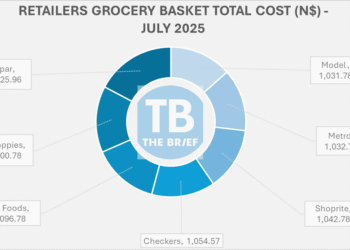
Namibia has failed to meet the World Health Organisation (WHO) target of vaccinating at least 40% of its eligible population by the end of 2021, Health minister Kalumbu Shangula has said.Â
Official statistics show that the country’s fully vaccinated population stands at 20.6% of the target population, whereas the WHO recommended population required to achieve national herd immunity is 60%.Â
This comes as the majority of African countries have failed to reach the 60% target due to lack of vaccines and hesitancy among the general population.Â
Minister Shangula said there are fears that Namibia may also fail to reach the WHO target of 70% of the eligible population by mid-2022. So far, only Mauritius and Seychelles have met the 70% target.Â
“As at 13 February 2022, a total of 432 976 persons have received one dose of COVID-19 vaccine nationally. This translates into 20.7% of the eligible population. Of these 425 578 are persons aged 18 years and above representing 28.9% and 7 398 are children aged 12-17 years, representing 2.4% of that eligible population. Collectively, 367 485 eligible persons are fully vaccinated, inclusive of 1 364 children aged 12-17 years. The average daily vaccination uptake keeps fluctuating but remains disappointingly low at 848 for new doses and 211 for second dose per day,†he saidÂ
“Although there had initially been extenuating circumstances that worked against our national vaccination efforts, the biggest challenge preventing Namibia from gaining the necessary traction to meet the WHO targets, is vaccine hesitancy amongst our population.â€Â
Economic analysts have warned that the country’s low vaccination rates could impact its economic recovery, amid concern low vaccination rates result in the spread of COVID-19 variants.Â
Shangula noted that the country has now emerged from the fourth wave amid an 89% decrease in tests conducted and 618% decline in new cases.Â
“We can now say that we have emerged from the fourth wave. However, the pandemic itself is not over. The number of cases being reported in recent weeks is more manageable, with an average of 52 cases per day in the last seven days. During the week of the last Public Briefing, the daily average was 450 new cases per day. From 16 January 2022 to 13 February 2022, a period of 29 days covering the current dispensations a total of 37 309 samples were tested, compared to 70 339 samples tested during the 29 days of the preceding dispensation. Out of these, 2 432 new cases were confirmed giving a positivity ratio of 6.5% compared to a 24.8% positivity ratio during the preceding period,†he said on Monday.Â
“Active cases have also decreased from 10 418 during the last briefing to 2 827 currently. Unfortunately, an additional 234 lives were lost since the last briefing, bringing the number of deaths to 3 995 since the beginning of the pandemic. Although fewer cases were reported during the period of current dispensation, we recorded more deaths, and most of these were confirmed during the current dispensation. More than ninety percent of these deaths are of unvaccinated individuals.â€
 Shangula said as of Sunday, 20 874 eligible persons had received their booster shot.Â
“As at 13 February 2022, a total number of eligible persons who have received booster doses in Namibia stood at 20 874, which is a 60% increase from 8 290 where we were during last briefing. We continue to implore more people to enhance their protection by going for the booster vaccines,†he said.Â
Shangula also announced the relaxation of some regulations, with public gathering attendees increased to 500 people, including spectators at the sporting events.Â
“As we officially pronounce the end of the fourth wave, we find it prudent to adjust the number of attendees at public gatherings from 200 to 500 persons per event. Maintenance of the minimum physical distance should apply and depending on the size of the venue, the number of attendees should be adjusted accordingly to comply with the minimum requirement of physical distancing,†he said in his 40th COVID-19 Update.Â
“Restrictions on the number of persons permitted at memorial services and burial sites are also increased to 500 attendees.â€











